Click here and press the right key for the next slide.
(This may not work on mobile or ipad. You can try using chrome or firefox, but even that may fail. Sorry.)
(If the slides don’t work, you can still use any direct links to recordings.)
also ...
Press the left key to go backwards (or swipe right)
Press n to toggle whether notes are shown (or add '?notes' to the url before the #)
Press m or double tap to slide thumbnails (menu)
Press ? at any time to show the keyboard shortcuts
Conclusion: Why Investigate Moral Psychology?
Why moral pscyhology?
1
human sociality
‘humans (both individually and as a species) develop morality because it is required for cooperative systems to flourish’
Hamlin 2015, p. 108
Modern humans
have recently (~10 000 years ago) begun to
live in societies roughly as complex as those of social insects
but cooperate with non-kin.
How is this possible?
‘Humans are [...] adapted [...] to live in morally structured communities’ thanks in part to ‘the capacity to operate systems of moralistic punishment’ and susceptibility ‘to moral suasion’
Richerson and Boyd, 1999 p. 257
‘intuitive ethics’ (Haidt & Joseph, 2004; Haidt & Graham, 2007)
harm/care
fairness (including reciprocity)
in-group loyalty
respect for authorty
purity, sanctity
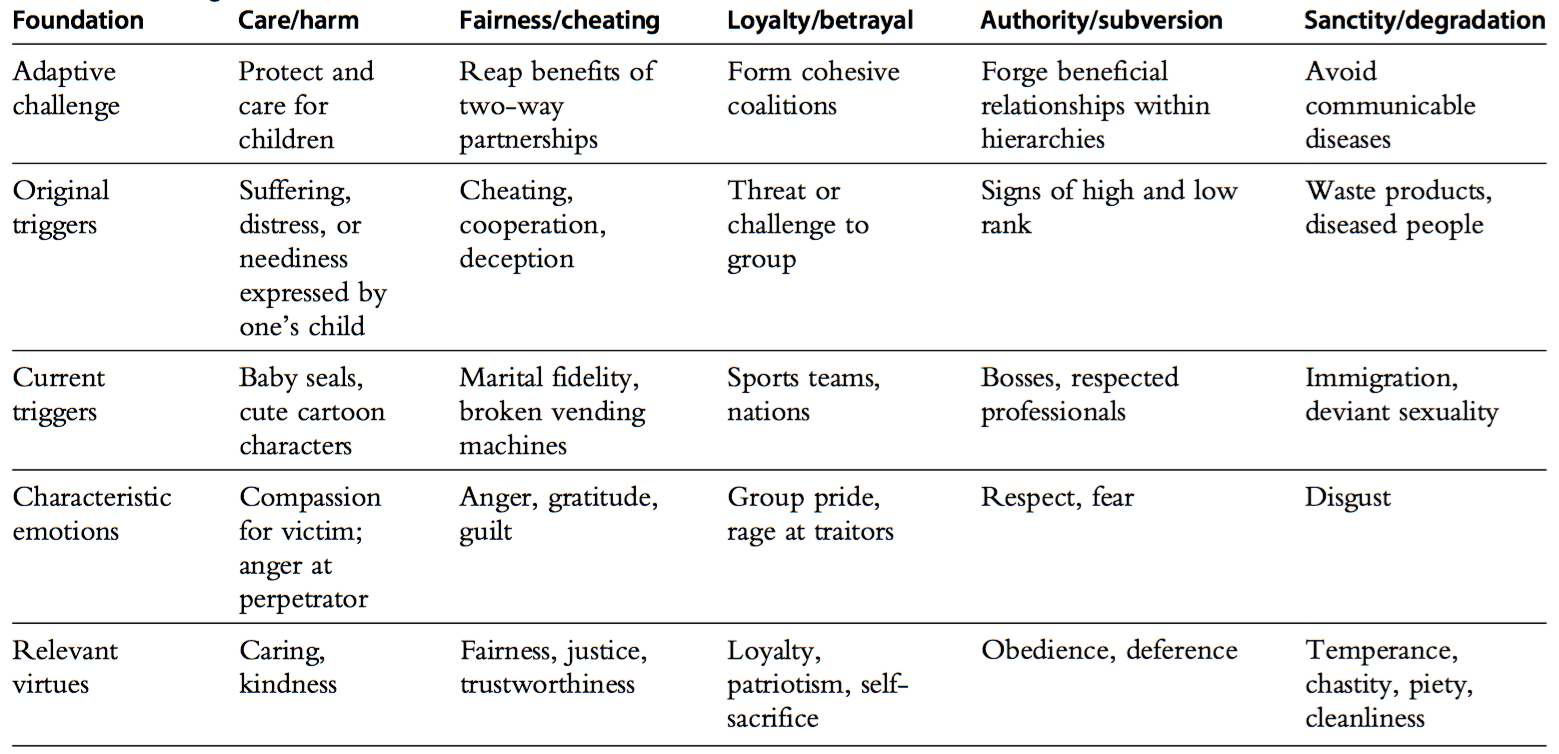
Graham et al, 2013 table 2.1


Graham et al, 2013 table 2.1
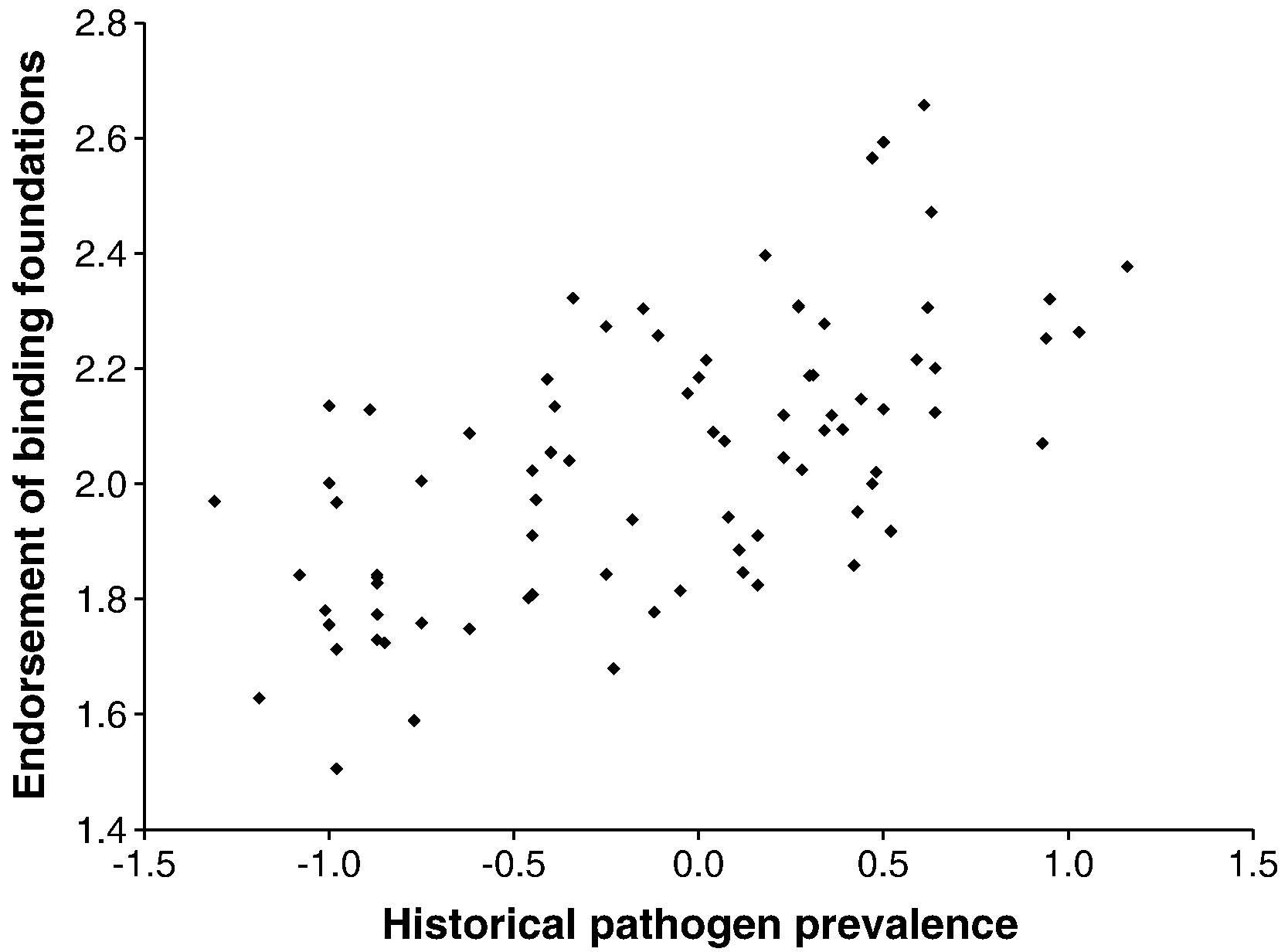
van Leeuwen et al, 2012 figure 1
Simon Myer’s lecture on partner-choice vs partner-control
-- Are different strategies linked to cultural variation in ethical principles?
1
human sociality
2
political conflict,
e.g. over climate change
Why are liberals generally more concerned about climate change than conservatives?
‘The moral framing of climate change has typically focused on only the first two values: harm to present and future generations and the unfairness of the distribution of burdens caused by climate change. As a result, the justification for action on climate change holds less moral priority for conservatives than liberals’
Markowitz & Shariff, 2012 p. 244
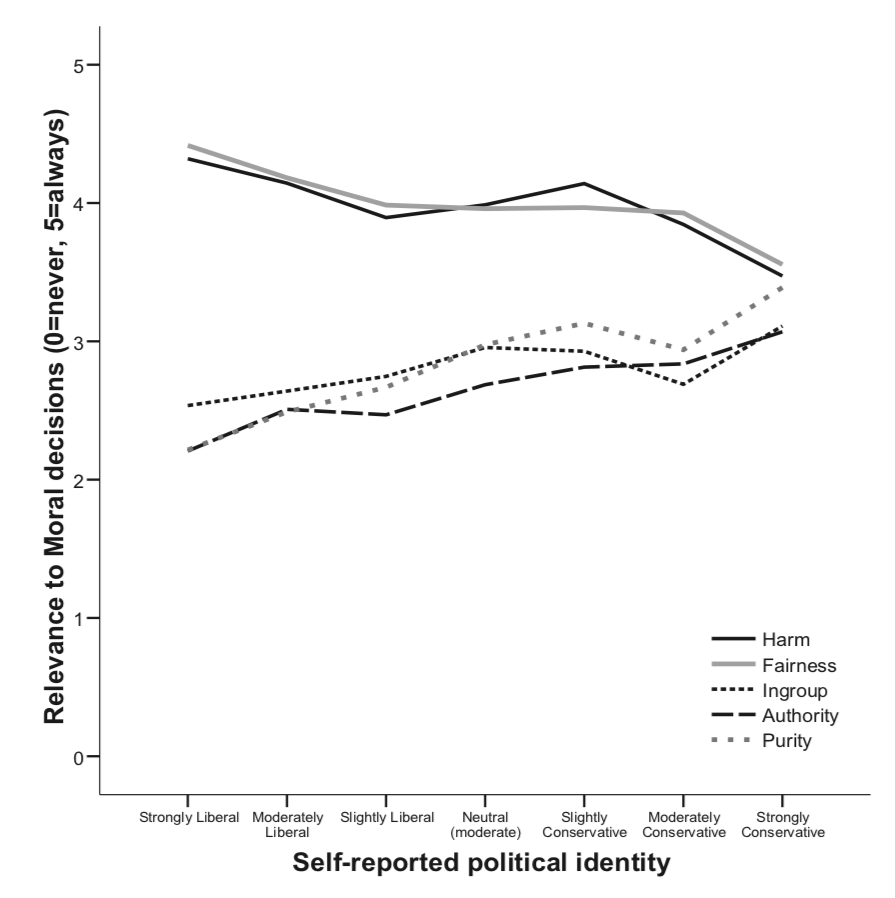
Graham et al, 2009 figure 1
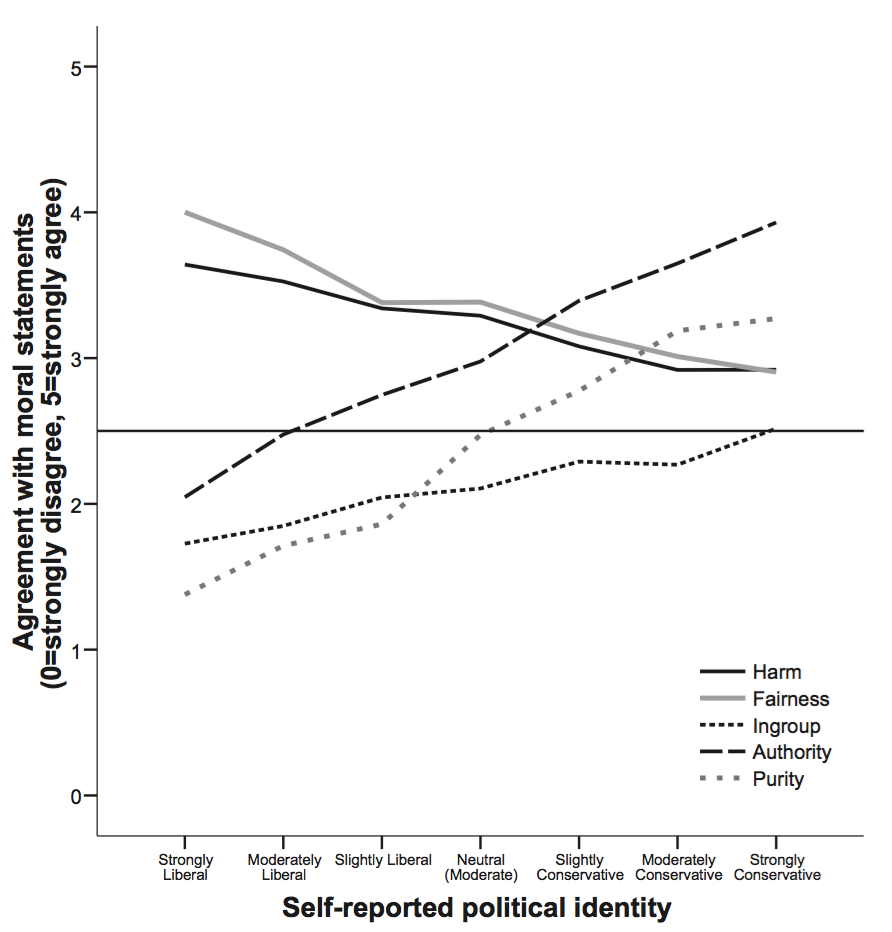
Graham et al, 2009 figure 3
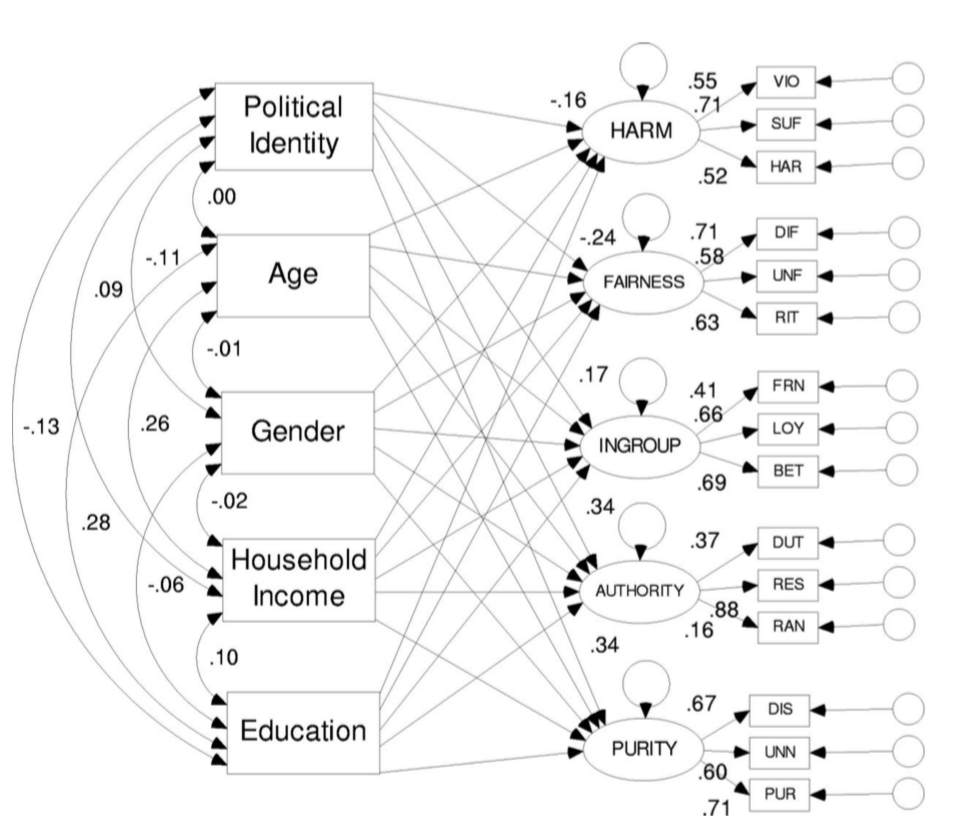
Graham et al, 2009 figure 2

Graham et al, 2009 figure 1
The Joan-Lars-Joseph objection
The evidence on cultural variation says socially conservative participants tend to regard all five foundations as roughly equally morally relevant.
This does not generate the prediction that socially conservative participants will be more likely to view climate issues as ethical issues when linked on one foundation (e.g. purity) than when linked to another foundation (e.g. harm).
Does Moral Foundations Theory provide a model that is invariant?
Davies et al, 2014 : metric invariance for gender groups
(scalar invariance not tested)
Davis et al, 2014 : metric but not scalar invariance for Black vs White people
Dogruyol et al, 2019 : metric non-invariance for WEIRD/non-WEIRD samples
‘across subscales, there were problems with scalar invariance, which suggests that researchers may need to carefully consider whether this scale is working similarly across groups before conducting mean comparisons’
Davis et al, 2016 p. e27

Graham et al, 2009 figure 1
Are the differences in means measurement artefacts?
On balance, this seems likely.
There is a risk of building a theory on measurement artefacts.
‘entire literatures can develop on the basis of faulty measurement assumptions.’
Davis et al, 2017 p. 128
Stop.
On balance, MFT seems to be supported by a growing body of evidence.
Although limited, MFT is probably useful and there is no better alternative.
2
political conflict,
e.g. over climate change
3
ethics?
Humans lack direct insight into moral properties
(Sinnott-Armstrong et al, 2010 p. 268).
Intuitions cannot be used to counterexample theories
(Sinnott-Armstrong et al, 2010 p. 269).
Intuitions are unreliable in unfamiliar* situations
(Greene, 2014 p. 715).
Philosophers, including Kant, do not use reason to figure out what is right or wrong, but ‘primarily to justify and organize their preexising intuitive conclusions’
(Greene, 2014 p. 718).
‘the sprouts are incipient tendencies to act, feel, desire, perceive, and think in virtuous ways. Each sprout corresponds to one of Mencius' four cardinal virtues:
(benevolence),
(righteousness),
(propriety), and
(wisdom).
’Even in the uncultivated person, these sprouts are active. They manifest themselves, from time to time, in virtuous reactions to certain situations’
‘characteristic of each sprout is a particular set of emotions or attitudes’
Norden 2002 pp. 46--7, p. 74 on Mencius
‘someone suddenly saw a child about to fall into a well: everyone in such a situation would have a feeling of alarm and compassion---not because one sought to get in good with the child's parents, not because one wanted fame among their neighbors and friends, and not because one would dislike the sound of the child's cries’
Mencius, Mengzi 2A6
progress since 4th century BCE
‘one may think of physical moral theory at first [...]
as the attempt to describe our moralperceptual capacity
[...]
what is required is
a formulation of a set of principles which,
when conjoined to our beliefs and knowledge of the circumstances,
would lead us to make these judgments with their supporting reasons
were we to apply these principles’
Rawls, 1999 p. 41

3
ethics?
Why investigate moral psychology?
human sociality
political conflict
ethics
...